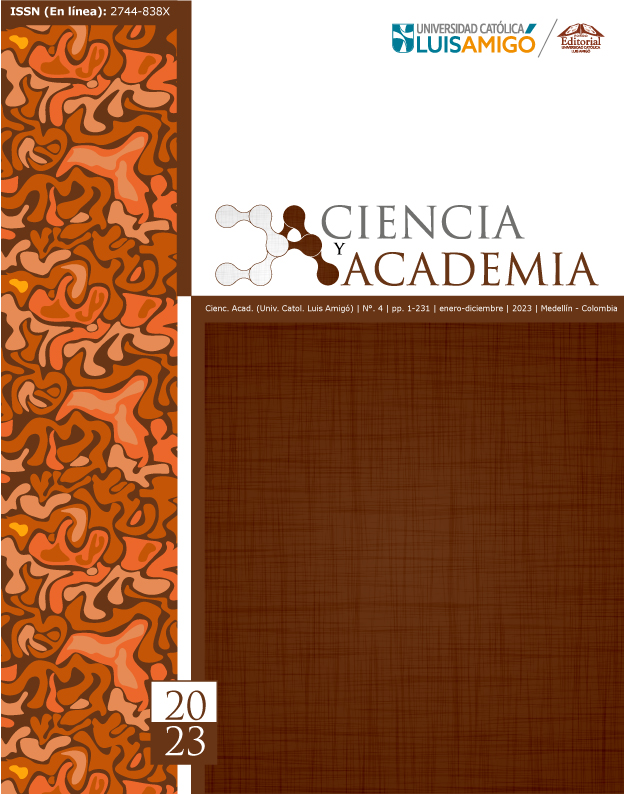The meaning of totalitarianism in Hannah Arendt´s thought
DOI:
https://doi.org/10.21501/2744838X.4141Abstract
The purpose of this paper is to trace the meaning of the philosophical concept of
totalitarianism in the work of the philosopher Hannah Arendt to establish whether
it is still valid to talk about this concept today and thus identify the link of the term
with some contemporary issues. The work analyzes the characteristics of totalitarian
regimes, which are based on terror and domination. From the interpretive analysis
of the work The Origins of Totalitarianism and The Human Condition, in the first
section, some essential concepts of this philosopher’s thought are addressed that
allow us to understand how totalitarianism precludes the authentic meaning of
politics. In the second section, on the other hand, some sociopolitical spectacles
that present some features of this phenomenon are analyzed, and the validity
of this concept is discussed. Finally, in the third section, the importance of the
philosophical understanding of totalitarianism is pointed out to avoid the repetition
of this phenomenon, which goes against the freedom and plurality of humans.
Downloads
References
Arendt, H. (1973). Crisis de la república: sobre la violencia. Taurus.
Arendt, H. (1998). Los orígenes del totalitarismo. Taurus.
Arendt, H. (2002). Comprensión y política (las dificultades de la comprensión).
Daimon Revista Internacional de Filosofía, 26, 17-30. https://doi.org/10.6018/
daimon
Arendt, H. (2003a). Eichmann en Jerusalén. Lumen.
Arendt, H. (2003b). La condición humana. Paidós.
Arendt, H. (2016). Entre el pasado y el futuro. Península.
Betancur Hernández, L. F. (2015). El terror en los orígenes del totalitarismo y la
política de la muerte. Ciencias Sociales y Educación, 4(8), 43-60. https://revistas.
udem.edu.co/index.php/Ciencias_Sociales/article/view/1742/1673
Di Pego, A. (2005). Lo social y lo público en la obra de Hannah Arendt: Reconsideraciones sobre una relación problemática. Memoria Académica 10(22-23), 39-69. http://maytemunoz.net/wp-content/uploads/2020/09/Anabella-DiPego-Lo-social-y-lopublico.pdf
Fabela, I. (1954). Macartismo continental. Cuadernos Americanos, 17-18. https://
archivos.juridicas.unam.mx/www/bjv/libros/6/2700/93.pdf
Garrido Larreguy, F. (2014-2015). Lo social en La condición humana de Hannah
Arendt: posibles aperturas políticas. Cuadernos del Sur, 43-44, 127-145. https://
ojs.uns.edu.ar/csf/article/view/1492
Martínez M. (2011). Totalitarismo: ¿un concepto vigente? Episteme, 31(2), 45-78. http://ve.scielo.org/scielo.php?script=sci_arttext&pid=S0798-43242011000200003&lng=es&tlng=es
Muñoz, M. T. (2010). Hannah Arendt: La recuperación de la dignidad política. Enclaves del Pensamiento, 4(8), 185-194. http://www.scielo.org.mx/pdf/enclav/v4n8/v4n8a10.pdf
Pabón Serrano, Ó. M. P. (2013). Los sistemas autoritarios en el contexto de la Guerra Fría: ensayo sobre la “era de las catástrofes” y el poder concentrado. Revista Temas, 7, 89-109. https://doi.org/10.15332/rt.v0i7.576
Pinardi, S. (2007). Hannah Arendt: la lógica del pensamiento ideológico o la radicalidad del mal. Episteme, 27(2), 129-145. http://ve.scielo.org/scielo.php?script=sci_arttext&pid=S0798-43242007000200006&lng=es&tlng=es
Sklarevich, S. (2002). Un recorrido por la obra de Hannah Arendt. La trama de la comunicación, 7, 281-292. https://doi.org/10.35305/lt.v7i0.267
Mckeever, A., & Beard, D. (2020). 2020 no es 1968: para entender las protestas actuales, hay que retroceder más. National Geographic. https://www.nationalgeographic.es/historia/2020/06/2020-no-es-1968-para-entender lasprotestas-actuales-hay-que-retroceder-mas
Tenzer, N. (1991). La sociedad despolitizada. Paidós.
Valencia Nieto, D. G. (2006). ¿Es posible recuperar el sentido de la política? Escribanía, 16, 67-77. https://revistasum.umanizales.edu.co/ojs/index.php/escribania/article/view/3036
Vargas, J. C. E. (2011). Los orígenes del totalitarismo de Hannah Arendt y la manipulación de la legalidad (el desafío totalitario de la ley). Iuris Tantum Revista Boliviana de Derecho, 11, 114-131. http://www.scielo.org.bo/scielo.
php?script=sci_arttext&pid=S2070-81572011000100006
Young-Bruhl, E. (2006). Hannah Arendt. Paidós.
Published
How to Cite
Issue
Section
License
Copyright (c) 2023 Ciencia y Academia

This work is licensed under a Creative Commons Attribution-NoDerivatives 4.0 International License.
La revista y los textos individuales que en esta se divulgan están protegidos por las leyes de copyright y por los términos y condiciones de la Licencia Creative Commons Atribución-No Comercial- 4.0 Internacional. Permisos que vayan más allá de lo cubierto por esta licencia pueden encontrarse en http://www.funlam.edu.co/modules/fondoeditorial/






